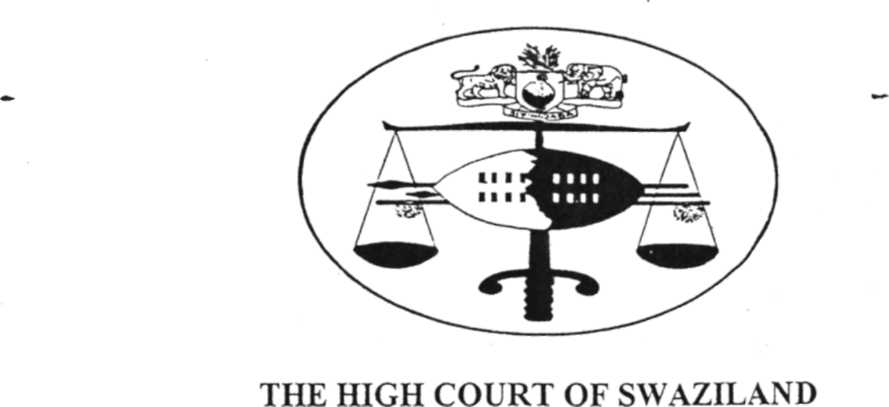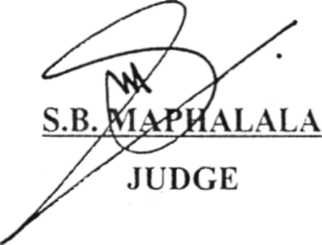

1
BUSISIWE MAKHANYA And ABSALOM MAKHANYA Civil Case No. 1430/2004
S.B. MAPHALALA - J MR. Z. MAGAGULA MR. M. SIMELANE Coram For the Applicant For the Respondent
JUDGMENT (10/06/2004) This is an urgent application for spoliation ante omnia directing the Respondent to return to Applicant forthwith 24 head of cattle taken away from the Applicant on the 24th May 2004. Further directing the Respondent to return to Applicant forthwith all the household goods including the blankets and clothes taken by Respondent from the homestead of Applicant on the 15th May 2004. Furthermore, restraining and interdicting the Respondent from setting foot at the Applicant's homestead. Failing compliance with prayer 2 and 3 hereto, authorising the Deputy Sheriff for the District of Shiselweni or
other authorised person to seize the aforesaid cattle and household goods and deliver same to Applicant. The Applicant further seeks for a cost order against the Respondent on the scale as between attorney and own client. The founding affidavit of the Applicant is filed in support of the application where it is revealed that the parties are husband and wife by virtue of a marriage contracted on the 23rd March 1991, in terms of civil rites. It is averred by the Applicant that her husband (the Respondent) deserted the matrimonial home in the year 2002 and now live with a certain widow in the Hluti area. From paragraphs 7 to 16 the Applicant relates the events leading to this application. She avers that the Respondent, in the company of two bakkie loads of people invaded her home on the 15th May 2004, broke down all the doors and proceeded to remove all the contents of the house including furniture, clothes, blankets, pots and such like. She avers further that on the 24th May 2004, the Respondent with a mob of five (5) people again invaded her home and this time drove away all the cattle from the kraal. She avers that she was in peaceful and undisturbed possession of this property and that the Respondent did not seek and/or obtain her consent to the removal of the house contents or the driving away of the cattle nor was he acting under the authority of a court order. She deposed further in paragraph 10 of her affidavit that on the 14th June 2002, this court granted an order restraining the Respondent from disposing of or slaughtering the cattle. In paragraph 11,12 and 13 allegations are made in respect of urgency. The Respondent opposes the granting of the application and has filed an answering affidavit thereto. He raised two preliminary objections and also addressed the merits of the matter. The points in limine arc. firstly that the requirements for applying for
an interdict have not been satisfied and alternatively the urgency is self-created. The second point is that the application is full of disputes of facts aifd thus cannot be decided on the papers as they stand. When the matter came up for arguments Mr. Simelane for the Respondent addressed me on the points in limine and to a large extent also covered the merits. The replies by Mr. Magagula for the Applicant took a similar vein. Therefore this judgment pertains to the matter as a whole. Before proceeding with the determination of the issues in this case I wish to put it on record in this judgment that the matter first appeared before Nkambule J on the 25th May 2004 who gave an order as follows: "The goods making the subject matter of prayer 3 to be returned to the Applicant on or before the 27(h May 2004. Respondent to file on or before the 27,h May 2004 at noon and postponed to 28lh May 2004 to the contested roll". I must further add that during the course of arguments Mr. Magagula for the Applicant abandoned prayer 4 viz restraining and interdicting the Respondent from setting foot at the Applicant's homestead. This therefore means that for present purposes only the issue of the mandament van spolie remains for determination as the issue of the interdict has been dispensed with by Applicant's abandonment of prayer 4. The authors Olivier et al The law of Property - Students' Handbook (2nd ED) at page 183 as regard the differences between interdicts and the mandament van spolie state the following and I quote: Some authors say that other remedies should also be seen as remedies for the protection of possession because the prevention of self-help in the interests of order in the community can also be achieved by means of these other remedies. The idea that the function of the mandament van spolie is unique in this regard, is, therefore, denied. Other authors are of the opinion that the mandament van spolie is unique and that it should be distinguished from the interdict since the functions and application of these two remedies differ fundamentally. The most important difference between the interdict and the mandament van spolie is that in the case of the interdict the Applicant has to prove that he has a clear right to the thing, while in the case of the mandament van spolie
the merits of his claim are not taken into consideration. The mandament van spolie is the - only remedy by which control of a thing is maintained without any reference to the merits thereof - and for exactly this reason it is unique. This remedy differs fundamentally from remedies which depend on the merits of the controller's claim to the thing, and should not be seen as a remedy for the protection of a right to possession. It is also accepted that by granting the mandament van spolie the court merely restores former control by the Applicant - this does not imply that the control is thereby condoned. Since the court does not i»vestigate the nature or merit of the disturbed control, unlawful or even illegal control can be restored by means of this remedy without condoning the unlawfulness of the former and restored control. It is trite law that in order for the Applicant to succeed in an application for a mandament van spolie he must show that (a) he was in peaceful and undisturbed possession of the things; and (b) he was unlawfully deprived of such possession (see Van Der Merwe et al, The Law of Things and Servitudes, Butterworths at page 71 and the cases cited thereat). In the present case it is abundantly clear from the facts advanced by the Applicant that the requirements outlined above have been satisfied. The case for the Respondent in his answering affidavit is based on the rights he has on the properties taken. This however is not the purpose of the application before court. The mandament van spolie is used to summarily undo the unlawful taking of existing control by restoring the control without investigation its merits (see Nino Bonino vs De Lange 1906 T.S. 120, 125 and Teko vs Qana 1973 (4) S.A. 735 (A) 739 G). This means that the court restores the Applicant's control without investigating the merits of the parties' rights to the thing, merely because control has been seized unlawfully by self-help. Furthermore, it would appear to me that the defence raised by the Respondent that he is married to the Applicant is inadmissible because exclusivity of control is not required. According to the decided cases of De Abren vs Silva 1964 (2) S.A. 416 T; Rosenbuch vs Rosenbuch 1975 (1) S.A. 181 (W); Oglodzinski vs Oglodzinski 1976 (4) S.A. 273 (D); Coetzee vs Coetz.ee 1982 (1) S.A. 933 (c) and that of Mankwitz vs Loewenthal 1982 (3) S.A. 758 (A) partners or spouses can commit spoliation with regard to things controlled in common. An act whereby one spouse or partner deprives the other of his control by taking exclusive control will constitute spoliation.
Finally, a point of potential substance raised by the Respondent is that when these items were taken the Applicant was not in possession thereof.*" However, legal authority on the subject does not support this argument in that in law it is not necessary for the Applicant to exercise comprehensive, continuous or personal control (see Olivier et al (supra) at paragraph 14.4.3.22 at page 185). Once physical control has been established, temporary interruptions thereof will not necessarily imply that control has been lost. In the case of Strydom vs De Lange 1976 (2) S.A. 6 (T) 11 H-12A it was held that control need not be exercised personally, but can be acquired and exercised for and on behalf of the controller by an agent. Therefore the submission that when the Respondent took away these items the Applicant was not in the homestead does not hold water in view of the legal authorities I have just cited. For the afore-going reasons therefore I rule that the Applicant is entitled to the order sought. In the result, an order is granted in terms of prayer 2, 3, and 5 of the notice of motion. The Respondent is further to pay wasted costs levied at the normal scale.